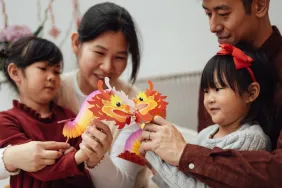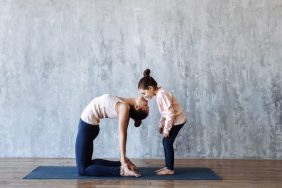I spend a lot of time trying to help my kids be healthy. I buy organic food and cook dinner almost every night. I take them to the playground so they’ll play outside. I remind them to wash their hands. I put them to bed on time so they’ll get enough sleep.
But sometimes I wonder whether I should put less effort into making them do healthy things and more effort into teaching them to take responsibility for their own health. Sure, right now it’s easy for me to enforce habits, but as they grow they’ll be better off if they understand why something is good for them.
So this year, I’m planning to do a little less nagging and a little more teaching. Instead of just telling my kids what to do, I want to help them understand how to take care of their bodies. Want to join me?
Here are ten healthy habits you can easily teach your kids to help them take charge of their own well being:
1. Encourage them to play outside. My kids usually prefer to play indoors—that’s where all their toys are, and they hate winter weather. But outdoor play makes kids more likely to burn more calories and to play more creatively. And being in sunlight (yes, even winter sun) gives kids a daily dose of vitamin D. I don’t tell my kids all the research on the benefits of playing outside, but I do tell them that playing outside is different for your body from playing inside—and that they need a balance of both to be healthy.
2. Teach them to wash their hands. For my busy toddler, any activity that requires standing still for more than three seconds feels like a waste of time. But washing hands correctly means scrubbing them for at least twenty seconds, and it’s one of the simplest ways to keep kids healthy. So when my kids were young toddlers, I started teaching them how to wash their hands properly, including the backs of their hands and between their fingers. To make it more fun, I encourage them to wash for as long as it takes to sing “Happy Birthday.”
3. Help them make sleep a priority. Could understanding the importance of sleep help cut down on bedtime battles? For my son, I think it’s starting to. He’s only three, but he’s starting to realize that sleep is important for his body—and that fighting bedtime could mean feeling yucky the next day. As I’m getting him ready for bed, I often remind him that his body is tired and needs to rest. On a good night, just reminding him that he’s tired can have a somnolent effect!
4. Teach your kids how to cook. There’s no better way to get kids to eat better than by getting them involved in meal preparation. My six year old can cook scrambled eggs with almost no help, and sometimes she asks to make them just because she can. But even when she just helps me by stirring a pot of vegetables, she’s more likely to at least taste foods she normally dislikes. I really want to teach her to cook another meal on her own this year—preferably something that involves greens.
5. Teach them about food allergies. Even if your kids don’t have food allergies themselves, it’s good for them to know about them so they can help their friends with allergies or intolerances stay safe. My kids don’t have allergies, but I want them to know how to read ingredients and labels. And for kids who do have allergies or food intolerances, it’s important to know that reading labels can be tricky. For example, a food that’s labeled “made with no gluten-containing ingredients” could have traces of gluten, while a food that’s labeled “gluten-free” (like Chex Gluten Free Cereal or Chex Gluten Free Granola) is safe for a child with a gluten intolerance.
6. Let them laugh. Kids don’t need an excuse to get silly, but why not teach them about the health benefits of laughter? Laughter helps relieve stress and improve immunity. By telling kids that laughter is good for them, I’m giving them permission to act silly—which makes the joke even more fun.
7. Show them how to floss and brush. Helping my kids floss and brush is one of my least favorite parts of bedtime. But although young kids do need help to clean teeth properly (our dentist told me I should help till at least age five or six), they’re never too young to start learning toothbrushing techniques. I let my toddler take a turn brushing himself, and then I take a turn to finish up.
8. Give them the tools to stay hydrated. It’s easy to remember to drink plenty of water when you’re thirsty and hot in the summer, but staying hydrated is important in winter, too. Each of my kids has their own water bottle, which they can fill themselves. My six year old sometimes brings a purse or a small backpack so she can carry hers herself, which makes her feel grown-up and responsible.
9. Wear sunscreen. Sunscreen should be worn all year round. Give your kids their own bottle the sunscreen and encourage them to cover up any skin that won’t be covered by clothes. (Of course, make sure you supervise young kids who might want to taste the sunscreen!)
10. Make a habit of cleaning up. Leaving a mess behind you is a great way to spread germs—especially if you’re sick. Sometimes, my kids get used to having me clean up after them, and teaching them to always clean up after themselves is a challenge. But dirty clothes or crumbs on the floor can lead to mold or insects, and a dirty tissue or used glass can spread cold germs to the whole family. I’m hoping that as my kids understand more why cleaning is important for health, they’ll be more motivated to pick up after themselves.
11. Make sure they know how to stay safe. My 3-year-old has my phone number memorized. My six year old knows our address, my phone number, and how to safely cross a street. They both know never to get in a car or go home with a stranger, and they know that they should find a policeman for help if they’re lost. Basic safety information like this is one of the most important things that every kid can learn to take charge of their own safety and health. Depending on the age of your kids, they can learn other skills as well.
12. Limit technology. Although the evidence is pretty clear that too much television is bad for kids, the jury’s still out on more interactive technology like tablets and smart phones. However, most experts recommend limiting screen time, especially for young kids. My kids are eerily proficient at learning new games on the iPad, but I make sure to keep it locked with a password, so they can’t use it without first getting my permission.
What healthy habits do you want your kids to learn this year?
This post is sponsored by Chex.
Photo: Getty
More Healthy Habits for Kids:








